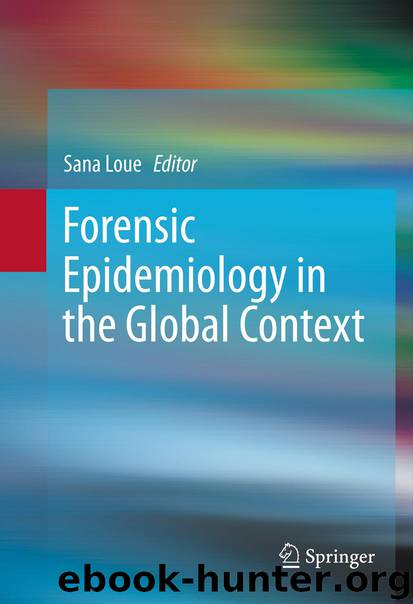Forensic Epidemiology in the Global Context by Sana Loue

Author:Sana Loue
Language: eng
Format: epub
Publisher: Springer New York, New York, NY
Conclusion
This chapter has demonstrated that the UK judiciary’s current scepticism of epidemiological evidence is founded upon a series of fundamental misconceptions of epidemiology as a discipline. By distinguishing epidemiology from the application of bare statistics, and by explaining that the courts are not automatically bound by an epidemiological result of 51+ % to hold that the causation has been established, it has sought to allay common judicial concerns about epidemiological evidence. It has further demonstrated that the current judicial approach to determining questions of probabilistic causation is fundamentally flawed and that it could be significantly improved through increased reliance on epidemiology.
It is not suggested here that epidemiology is capable of solving of the law’s problems with probabilistic causation. Depending on the substance of the causal issue at stake, and in particular on the disease in question, epidemiology will be more helpful in some cases than in others. This is because some areas of epidemiological research are more developed than others. Nor is it suggested that epidemiological evidence should be used on its own to determine questions of causation. The argument being made is that epidemiology can provide the courts with potentially useful pieces of information about causation. In determining causation, the courts must assess the totality of the evidence submitted and the weight to be given to each component thereof. In exceptional cases where epidemiological evidence is the only form of evidence submitted, and it is both strong and pertinent, the court may wish to entertain such evidence as the sole basis for determining causation. While epidemiology can obviously never tell the court what actually happened in an individual case, where tort law claims are concerned, the claimant is not required to prove what actually happened but only what was likely to have happened. In practice, the claimant needs only provide an account of causation that is plausible and at least marginally more convincing than the defendant’s and vice versa.
To ensure that epidemiology is used properly as a legal tool, it is essential that epidemiologists are employed as expert witnesses in appropriate cases. In this respect, the UK judiciary needs to move away from the practice of using clinicians for all matters pertaining to biomedical science and to appreciate that medical science is a huge discipline encompassing numerous subdisciplines. The introduction of a pretrial admissibility test for scientific evidence in civil litigation would also help to protect the reputation of epidemiology.
Most importantly of all, personal injury lawyers need to learn more about epidemiology. Similarly, epidemiologists would benefit from learning more about tort law. A basic understanding of the correct tort law principles of causation would encourage epidemiologists to contemplate the potential legal applications of their discipline, to take on the role of expert witness, and to execute this role in an effective manner. Arguably, the greatest lesson to take away from the UK’s negative legal experiences of epidemiology is the need to develop interdisciplinary research collaborations. Through such collaborations, lawyers and epidemiologists can learn from each other and work together to improve legal decision-making about causation.
Download
This site does not store any files on its server. We only index and link to content provided by other sites. Please contact the content providers to delete copyright contents if any and email us, we'll remove relevant links or contents immediately.
Rewire Your Anxious Brain by Catherine M. Pittman(18654)
Talking to Strangers by Malcolm Gladwell(13370)
The Art of Thinking Clearly by Rolf Dobelli(10489)
Mindhunter: Inside the FBI's Elite Serial Crime Unit by John E. Douglas & Mark Olshaker(9342)
Becoming Supernatural by Dr. Joe Dispenza(8217)
Change Your Questions, Change Your Life by Marilee Adams(7780)
Nudge - Improving Decisions about Health, Wealth, and Happiness by Thaler Sunstein(7706)
The Road Less Traveled by M. Scott Peck(7603)
The Lost Art of Listening by Michael P. Nichols(7506)
Mastermind: How to Think Like Sherlock Holmes by Maria Konnikova(7347)
Enlightenment Now: The Case for Reason, Science, Humanism, and Progress by Steven Pinker(7313)
Win Bigly by Scott Adams(7197)
The Way of Zen by Alan W. Watts(6614)
Daring Greatly by Brene Brown(6513)
Big Magic: Creative Living Beyond Fear by Elizabeth Gilbert(5771)
Grit by Angela Duckworth(5614)
Ego Is the Enemy by Ryan Holiday(5447)
Men In Love by Nancy Friday(5240)
The Laws of Human Nature by Robert Greene(5208)
